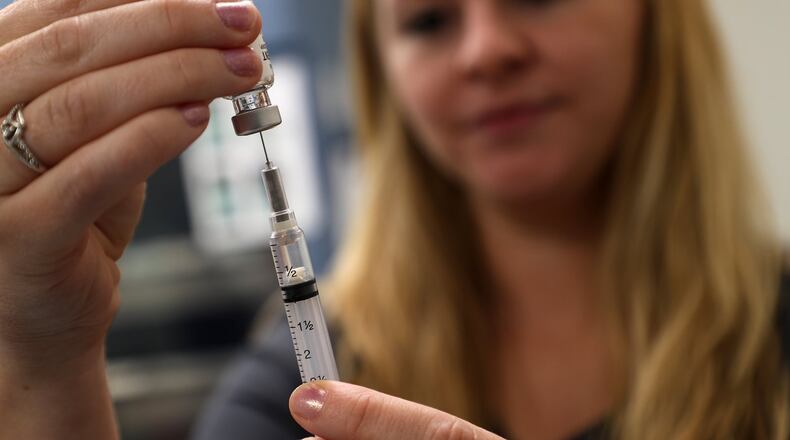MORE: How many kids are vaccinated at your school? Find information for each school in Ohio.
The measles case was first reported by the state on Friday, June 12 and involved a young adult from Stark County, who recently traveled to a state with confirmed measles cases. Ohio Department of Health is not sharing any other information about the infected person.
While the measles case is in northeast Ohio, local public health officials have been paying attention to the case and to outbreaks happening in other states.
Charles Patterson, Health Commissioner for the Clark County Combined Health District, said the best reason for people to get vaccinated is to protect themselves and their loved ones.
“Measles itself is covered in the MMR vaccine- which covers measles, mumps and rubella- it’s a combination vaccine,” Patterson said. “We try to make it easier for people to make sure that they don’t have to get three shots they can just get one and it protects them from all those diseases.
Measles is one of the most contagious diseases, Patterson said.
“The thing that is most contagious about measles is that 95% of the people who come in contact with a person that has the disease, and is able to transmit it, will become ill with measles if they are not adequately vaccinated,” Patterson said. “Of those people, 20% will have significant complications.”
According to Patterson, 1 out of a 1,000 people who contract measles are at risk of death.
“If you are looking at do I want to get a vaccine and have some pain in my arm and some very slight risk of something happening from a vaccine or do I want a 1 in a 1,000 chance that I could die from getting the measles? I think I would get the vaccine,” Patterson said.
Following the Stark County measles case, Ohio Department of Health has been sharing vaccination guidance and information with partner organizations such as local health departments, hospitals, health care providers, K-12 educators and school nurses, higher education leaders, other state agencies and faith-based organizations.
Ohio occasionally sees measles cases as the result of importations from other countries where measles remains endemic.
This is the first confirmed measles case in Ohio since 2017. Twenty-eight states, including many neighboring states, already have measles cases, with several having confirmed measles outbreaks.
Previously, Ohio’s last confirmed measles outbreak was in 2014, with 382 confirmed cases.
Higher immunization rates lead to better protection for everyone against vaccine-preventable diseases, and high rates also help protect babies who can’t be vaccinated yet, those with compromised immune systems and people with medical exemptions from vaccines, who rely on herd immunity to protect them.
As of 2017, the CDC estimated 88.3 percent of Ohio children 19 to 35 months old had at least one dose of the MMR vaccine, which protects against measles, mumps and rubella.
“Vaccination is the safest, most effective way to prevent serious vaccine-preventable diseases in children and adults, including measles,” Acton said.
Related: Ohio schools challenged by vaccine exemptions, data challenges
Meanwhile, there are several bills pending before the Ohio General Assembly that could affect vaccine policy.
Senate Education Committee Chairwoman Peggy Lehner, R-Kettering, proposed a bill only allowing vaccine exemptions for children with medical reasons. Lehner and state Sen. Sandra Williams, D-Cleveland, recently asked colleagues to join them in sponsoring the bill.
The bill will likely draw opposition from conservative lawmakers who place a premium on individual rights are expected to oppose the bill. In other states, opponents to such bills testified that the measures take away parental rights and violate religious freedoms.
Ohio lawmakers are also considering legislation, House Bill 132, that would require school districts to tell parents how to opt out of immunizations.
Under current law, Ohio allows parents to opt out of childhood vaccinations for medical or "reasons of conscience." House Bill 132 would require the broad opt-out language is spelled out on the school forms.
Also pending in the Ohio House is a bill to bar employers from mandating vaccinations as a condition of employment — something Ohio hospitals and other employers oppose.
MORE: Local lawmaker wants to only allow kids to skip vaccinations for medical reasons
House Bill 268 would allow workers to opt out of vaccines and prevent employers from requiring those shots as a condition for employment. Similar proposals targeting flu shots have failed in committee in previous General Assembly sessions.
Measles symptoms include a rash, high fever, runny nose, cough, loss of appetite and red, watery eyes. Diarrhea and ear infections are common complications of measles.
One one out of every 20 children with measles gets pneumonia, which can be deadly, and about one child out of every 1,000 with measles develops brain swelling that can lead to convulsions and can leave the child deaf or with an intellectual disability.
Clark County Combined Health District
Immunizations are available at CCCHD and appointments are available 7:30 a.m.-5 p.m. Monday, Wednesday and Friday. Clark County residents can call 937-390-5600 anytime and ask to reserve an appointment.
